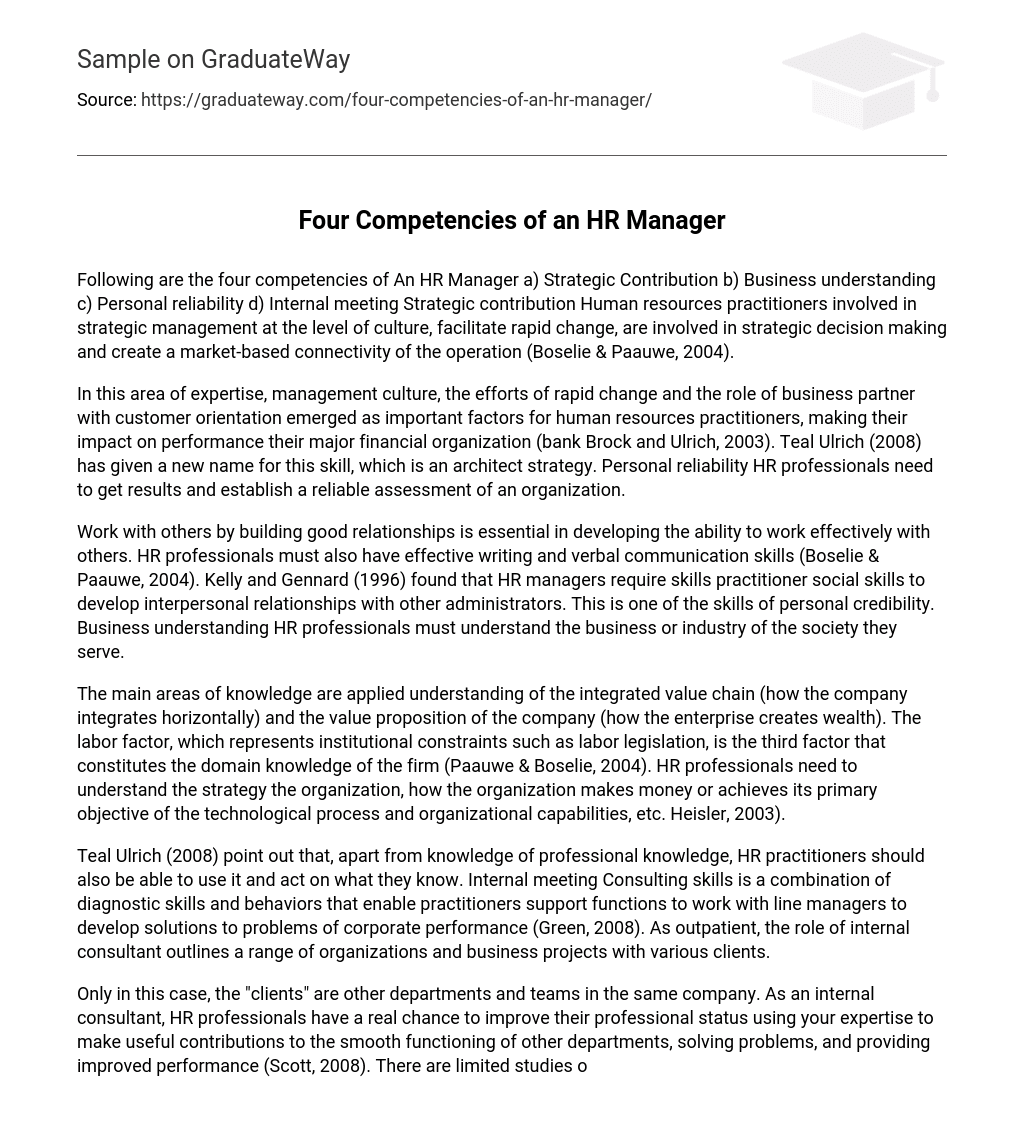Following are the four competencies of An HR Manager a) Strategic Contribution b) Business understanding c) Personal reliability d) Internal meeting Strategic contribution Human resources practitioners involved in strategic management at the level of culture, facilitate rapid change, are involved in strategic decision making and create a market-based connectivity of the operation (Boselie & Paauwe, 2004).
In this area of expertise, management culture, the efforts of rapid change and the role of business partner with customer orientation emerged as important factors for human resources practitioners, making their impact on performance their major financial organization (bank Brock and Ulrich, 2003). Teal Ulrich (2008) has given a new name for this skill, which is an architect strategy. Personal reliability HR professionals need to get results and establish a reliable assessment of an organization.
Work with others by building good relationships is essential in developing the ability to work effectively with others. HR professionals must also have effective writing and verbal communication skills (Boselie & Paauwe, 2004). Kelly and Gennard (1996) found that HR managers require skills practitioner social skills to develop interpersonal relationships with other administrators. This is one of the skills of personal credibility. Business understanding HR professionals must understand the business or industry of the society they serve.
The main areas of knowledge are applied understanding of the integrated value chain (how the company integrates horizontally) and the value proposition of the company (how the enterprise creates wealth). The labor factor, which represents institutional constraints such as labor legislation, is the third factor that constitutes the domain knowledge of the firm (Paauwe & Boselie, 2004). HR professionals need to understand the strategy the organization, how the organization makes money or achieves its primary objective of the technological process and organizational capabilities, etc. Heisler, 2003).
Teal Ulrich (2008) point out that, apart from knowledge of professional knowledge, HR practitioners should also be able to use it and act on what they know. Internal meeting Consulting skills is a combination of diagnostic skills and behaviors that enable practitioners support functions to work with line managers to develop solutions to problems of corporate performance (Green, 2008). As outpatient, the role of internal consultant outlines a range of organizations and business projects with various clients.
Only in this case, the “clients” are other departments and teams in the same company. As an internal consultant, HR professionals have a real chance to improve their professional status using your expertise to make useful contributions to the smooth functioning of other departments, solving problems, and providing improved performance (Scott, 2008). There are limited studies on the relationship between HR competencies and roles of human resources.
Anyway, two recent surveys by the Society for Human Resource Management (2002) and HR Outsourcing Association (2007) have been discussed earlier gave us some clues about the relationship between two variables. These investigations identified that the inability of HR professionals to measure the direct impact of HR on the bottom line and inadequate skills of HR professionals are the main obstacle seems to HR professionals play a strategic objective. Business Huselid et al. 1997) to identify the skills and competencies required for firms as important for effective human resource management. Professional skills and expertise include European Journal of Social Sciences – Volume 7, Number 1 (2008) 93skills relevant to the performance of excellent in a traditional HR department. However, Huselid et al. (1997) argued that although the skills of HR management are necessary for effective HR management ensuretechnical, professional skills are not sufficient to act as a strategic partner.
Therefore, the business-related skills are also important because they enable HR professional to understand how commercial considerations within an organization may create organization specific management HR needs. Business-related skills are the amounts of business skills and experience that member of staff outside of their functional specialty. These skills should determine the roles of human resources in particular to facilitate the selection and implementation of policies and practices HR management that will fit into a single organization.
References
Aitchison, D. 2007), HR Transformation : Myth or Reality. HROA Europe and SharedpertiseForums in Association with TPI. Survey report January 2007[2] Boselie, P. & Paauwe, J. (2004). Human resource function competencies in EuropeanCompanies. Personnel Review Vol. 34 No. 5, 2005 pp. 550-566. [3] Brockbank, W. & Ulrich, D. (2003). Competencies for the New HR: Society for HumanResource Management, University of Michigan Business School, Global Consulting Alliance. [4] Brockbank, W. , Ulrich, D. & Beatty, R. (1999). The Practitioner Development: Creating theFuture Creators at the University of Michigan Business School.
Human Resource Management,38(2), 111-118. [5] Brockbank, W. , Ulrich, D. & James, C. (1997). Trends in human resource competencies. AnnArbor: University of Michigan School of Business. [6] Barney, J. B. , and P. M. Wright. (1998). On becoming a strategic partner: The role of humanresources in gaining competitive advantage. Human Resource Management 37 (1): 31-46. [7] Becker, B. , Huselid, M. , & Ulrich, D. (2001). The HR Scorecard: Linking People, Strategy, andPerformance. Boston: Harvard Business School Press.





